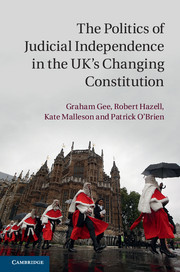Description
The Politics of Judicial Independence in the UK's Changing Constitution
Authors: Gee Graham, Hazell Robert, Malleson Kate, O'Brien Patrick
This book draws on interviews and primary sources to argue that the protection of judicial independence is a political achievement.
Language: English
Subject for The Politics of Judicial Independence in the UK's...:
Approximative price 103.03 €
In Print (Delivery period: 14 days).
Add to cart
Publication date: 03-2015
306 p. · 15.2x22.9 cm · Hardback
306 p. · 15.2x22.9 cm · Hardback
Description
/li>Contents
/li>Biography
/li>
Judicial independence is generally understood as requiring that judges must be insulated from political life. The central claim of this work is that far from standing apart from the political realm, judicial independence is a product of it. It is defined and protected through interactions between judges and politicians. In short, judicial independence is a political achievement. This is the main conclusion of a three-year research project on the major changes introduced by the Constitutional Reform Act 2005, and the consequences for judicial independence and accountability. The authors interviewed over 150 judges, politicians, civil servants and practitioners to understand the day-to-day processes of negotiation and interaction between politicians and judges. They conclude that the greatest threat to judicial independence in future may lie not from politicians actively seeking to undermine the courts, but rather from their increasing disengagement from the justice system and the judiciary.
Preface; 1. Introduction; 2. The politics of judicial independence and accountability; 3. The new Lord Chancellors and the Executive; 4. The courts service, salaries and pensions; 5. Relations between judges and parliament; 6. Judicial leadership and the internal governance of the Judiciary; 7. Judicial appointments; 8. The UK Supreme Court; 9. Scotland and Northern Ireland; 10. Conclusion.
Graham Gee is a Senior Lecturer at the University of Birmingham.
Robert Hazell is Professor of Government and the Constitution and Director of the Constitution Unit at University College London.
Kate Malleson is Professor of Law at Queen Mary, University of London.
Patrick O'Brien is a Fellow in Law at the London School of Economics and Political Science.
Robert Hazell is Professor of Government and the Constitution and Director of the Constitution Unit at University College London.
Kate Malleson is Professor of Law at Queen Mary, University of London.
Patrick O'Brien is a Fellow in Law at the London School of Economics and Political Science.
© 2024 LAVOISIER S.A.S.




